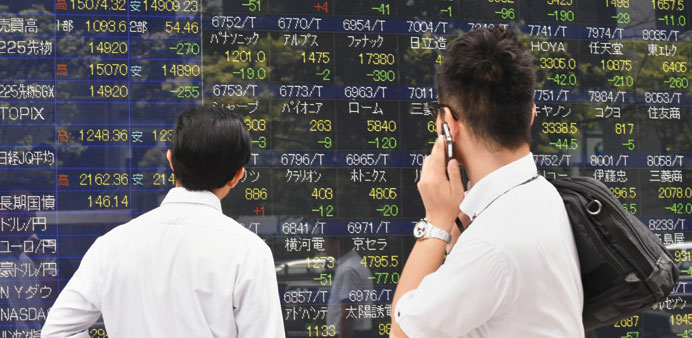Pedestrians look at a share prices board in Tokyo. The Nikkei index closed up 1.91% yesterday.
AFP
Tokyo
A fall in Japanese exports to China in September fanned expectations that Tokyo will unveil fresh stimulus, putting pressure on the yen and helping the country’s main stock market lead most Asian equity markets higher yesterday.
The latest weak trade figures add to increasing pressure on the Bank of Japan as the economy struggles to gain traction and a hoped-for pick-up in inflation fails to materialise.
It also highlights the ongoing weakness in China, a crucial driver of global growth that is expanding at its slowest annual pace in a quarter of a century.
However, while extra monetary stimulus is expected by the BoJ—in effect printing more cash—the dollar was unable to break away as dealers bet the Federal Reserve will delay lifting interest rates until next year.
Shares in Toyota were unaffected by news the car giant had recalled 6.5mn vehicles over a window defect that presented a fire risk. The company said it had not received reports of accidents or injuries tied to the problem.
The announcement follows the callback in recent months of nearly 10mn vehicles over an air bag problem that was linked to several deaths globally.
Japan’s official data showed shipments to China slipped 3.5% in September, Japanese data showed, while those to other Asian countries were also down.
Export volume to the key US market was also down.
A slowdown in China’s vast economy has spooked traders and a shock yuan devaluation in August precipitated a plunge in global markets that wiped trillions off valuations.
“Exports are weak across the board and that trend is expected to continue for the time being,” said Taro Saito, a senior researcher at NLI Research Institute.
“While exports to Asia and China are weak, more importantly volumes to the US are slowing.”
Analysts said the news will fan calls for the BoJ to ramp up its already massive bond-buying scheme aimed at inflating the Japanese economy.
“Whenever we get negative economic news, hopes for additional monetary easing move the market,” Takashi Aoki, a fund manager at Mizuho Asset Management Co, told Bloomberg News.
“We’re starting to see hard evidence for our fears about the global economy being weak.”
Hopes the central bank will make borrowing cheaper for investors pushed the Nikkei index 1.91% higher by the close, with a weaker yen supporting exporters. Toyota ended 2% up.
Among other stock markets, Shanghai reversed earlier gains to sit 2.66% lower in the afternoon after enjoying a recent rally that saw it hit an eight-week high.
Dealers have been betting on the Chinese government introducing new measures to kick-start growth in the economy but analysts said the Wednesday sell-off could be expected as profit-takers cashed in.
“This correction is normal considering the recent decent performance,” said Gerry Alfonso, a sales trader at Shenwan Hongyuan Group in Shanghai.
Seoul edged up 0.18% by the close and Sydney rose 0.24%. There were also gains in Singapore, Jakarta, Wellington and Manila.
Hong Kong was closed for a public holiday.
The dollar bought ¥119.95 compared with ¥119.84 in New York and well up from ¥119.44 earlier Tuesday in Asia.
The euro bought ¥136.22 and $1.1360 against ¥135.97 and $1.1346 in US trade. It bought ¥135.30 and $1.1328 in Asia Tuesday.
The single currency got a lift after the European Central Bank said eurozone banks reported that its own stimulus programme had led to an improvement in lending conditions for businesses.
Additional liquidity made available to banks through the ECB’s bond-buying scheme, launched in March, was being used to grant loans over the past six months.

